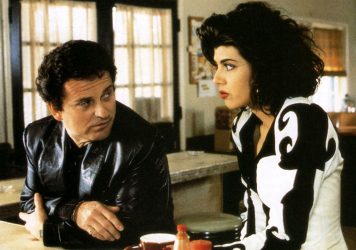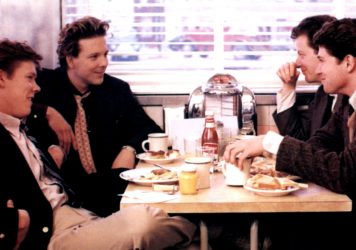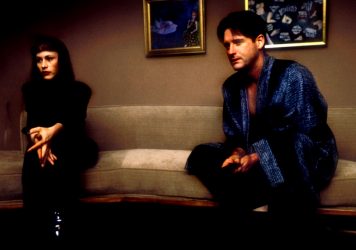
Twenty-five years ago, Tony Scott’s True Romance opened in theatres, becoming an instant cult classic. A darkly comedic action romance, the genre-busting film bursts with colour and poetry. A road movie in the tradition of Nicholas Ray’s They Live by Night with a ’90s twist, True Romance is blood, boobs and bubblegum. A dirty little after-dinner snack that probably isn’t good for you, but tastes oh so good. For me, it’s not the blood or the shit-stained watch that makes this film so enduringly likeable, it’s Patricia Arquette and her iconic performance as Alabama Whitman.
When I think of Arquette, I always imagine her voice. She has the timbre of sweetness, tinged with a raspy tremble. There is a song in her rhythm, a tentativeness that lies between coy and confident. When she raises her voice, you want to stop and listen. Like many great actors, Arquette just has a way of breathing and pausing that captures your attention. She rules all her monologues by a sense of anticipation, you want to know what she has to say next.
There is an inherent vulnerability to her appeal, one that undercuts the performative coolness of Quentin Tarantino’s script. On the rooftop with Clarence (Christian Slater), as she comes clean that she’s a sex worker, she screams at him, “I’ve been a call girl for exactly four days and you’re my third customer.” With a blanket wrapped around her head, tears in her eyes, she is afraid that the man she’s falling in love with might not see her the same way. It isn’t shame that motivates her, but a fear that the love in her heart might be as corrupted as everything else.
There are not many female characters in the work of Tarantino who demonstrate that level of vulnerability. Characters like Shosanna or The Bride, default to rage when they are humiliated or confronted with difficult emotions. While to a lesser extent, only Pam Grier as Jackie Brown is allowed that kind of vulnerability. Scott has a better track record but not much either. Arquette stands out as a female character that subverts the idea of feminine bad-ass by indulging her more sensitive impulses, mixing shyness with confidence.
One of the more difficult aspects of her character is that she is often performing. While with Clarence, her mask quickly drops – she uses her guile to get ahead. Returning to her motel room, as she enters the room Virgil (James Gandolfini) is sitting in a chair with a shotgun. For a moment, fear races against her face, but she tosses her bag over her shoulder and flirts. She’s wearing leopard print pants and blue sunglasses, her giggles are crystalline. Even with sunglasses on, she tries not to meet his eye, afraid perhaps that he’ll see through her ruse.
She’s pretty and he’s charmed. She offers him a cigarette, he refuses but his mind is no longer on the gun. It’s not a femme fatale seduction but an adolescent game, and Gandolfini plays off her with a similar teenage energy. He is shy and a bit embarrassed, he even blushes. In spite of the strangeness of the interaction, a young woman nonplussed by the shotgun in his lap, he easily buys into the idea that a woman could be so innocent and so feminine that she wouldn’t be phased by his presence.
It’s an incredible scene, in part because it accepts the artifice of our real world. In Scott and Tarantino’s over-the-top cinema universe, Arquette serves as the bridge between the world of real emotions and the artificial ones. Her presence highlights the power of cinema to draw out real feelings and ideas out of fiction, while also hinting at the accepted fictions of our lived experiences. The performative aspect of femininity, in particular, is highlighted as not just an accepted fiction but one that is actively encouraged in large swathes of society.
Arquette went on to star in some of the best movies of the next 20 years. Her dual role in David Lynch’s Lost Highway is an even greater articulation of vulnerability and artifice on screen. One of Arquette’s great talents as an actor is an understanding of the bigger picture and her ability to balance different realities at once. Even on a show like Medium, where she is gifted with visions, her great talent as an actor is the ability to live in the reality of the accepted world and the unknown realm of the subconscious and supernatural.
Patricia Arquette is one of the great actors of her generation and her role as Alabama stands out as among the most compelling performances of the 1990s. As True Romance celebrates its 25th anniversary, it’s time to give Arquette her due in the building of a cult classic. Her role as Alabama is more than just great acting, it uplifts the whole film.
Published 9 Sep 2018

With her strong self-belief and striking dress sense, Mona Lisa Vito is a character we can all get behind.

Barry Levinson’s rapid-fire dialogue and use of popular music set the blueprint for Tarantino’s style.

The cult director’s peek behind the curtain of this iconic American city reveals the horrors within.